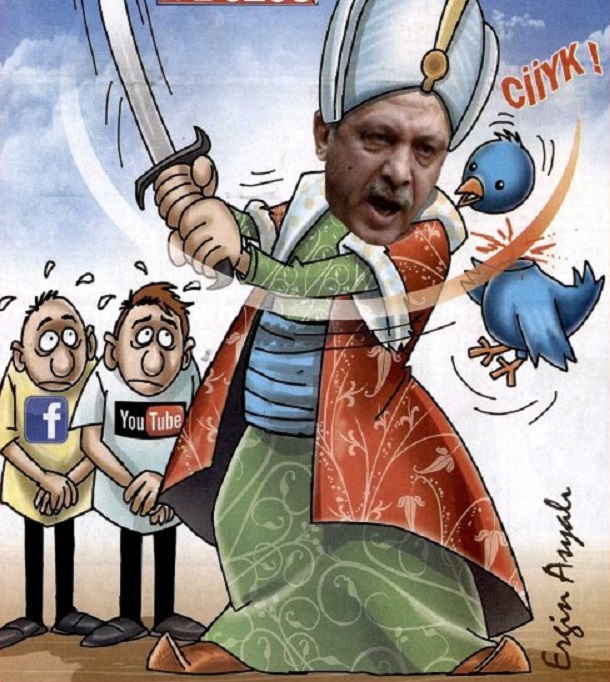A survey conducted among decision-makers in several Western countries has revealed that the image of both the Justice and Development Party (AK Party) and President Recep Tayyip Erdoğan in the eyes of most of the Western power elite is an authoritarian one, demonstrating that simply because a government is elected, it does not mean that the perception in the West will be that it is democratic and pro-freedom.
The survey, which was carried out by Fatih University and the İstanbul branch of the Journalists and Writers Foundation (GYV), took place in the form of online interviews with a total of 176 people including politicians, businessmen, academics, researchers, journalists, civil society representatives and decision-makers in the US, Germany, the UK and France between Nov. 1 and Dec. 28.
According to the results of the survey, decision-makers in the West have a relatively positive perception of the AK Party compared to their perception of Erdoğan, one of the founders of the AK Party, its leader and the country's prime minister for 12 years until his election to the presidency in August.
A total of 54 percent of the respondents who took the survey said they find the ideology of the AK Party to be authoritarian, while 23 percent said it is conservative and 16 percent said it is Islamist. Only 3 percent of the respondents described the party as liberal democrat.
When it comes to Erdoğan, an overwhelming majority of the respondents, 77 percent, said they see Erdoğan as an authoritarian leader, 10 percent called him Islamist and 8 percent called him conservative. Only 3 percent of the respondents said they think Erdoğan is a liberal democrat leader.
“The fact that Turkey's decision-makers are viewed in such a negative light makes Ankara's global prestige questionable. If the support of the international community is needed in the future for the settlement of regional problems that concern Turkey, the current picture may place Turkey in a difficult situation. It is evident that coming to power via elections is not seen as sufficient to be identified with a democratic and pro-freedom identity in Western societies,” said those conducting the survey when reporting its results.
When asked about the state of bilateral relations between Turkey and their own countries and whether they are in a better state in comparison to five years ago, 66 percent of the respondents said relations between Turkey and their country are now worse. A total of 56 percent of the respondents said they think Ankara's foreign policy preferences are not in line with the West's preferences, while 75 percent said they do not think Ankara has been following an effective and successful foreign policy over the past five years.
 The Western decision-makers were also asked whether they think the AK Party government espouses European values such as the supremacy of law, democracy, human rights, pluralism and freedom. Disappointingly, 84 percent of the respondents of the survey said they do not think the AK Party government is in line with or follows fundamental European values. There is also a strong perception that the AK Party government is moving away from its Western allies and their democratic and pro-freedom values.
The Western decision-makers were also asked whether they think the AK Party government espouses European values such as the supremacy of law, democracy, human rights, pluralism and freedom. Disappointingly, 84 percent of the respondents of the survey said they do not think the AK Party government is in line with or follows fundamental European values. There is also a strong perception that the AK Party government is moving away from its Western allies and their democratic and pro-freedom values.
The AK Party government has been receiving growing criticism for following anti-democratic policies, restricting freedoms, silencing dissent and disregarding the law over the past few years. These criticisms have reached an alarming level since a graft probe became public on Dec. 17, 2013 revealing the alleged involvement of top government figures in bribery and corruption.
The AK Party government also attracts criticism for frequently violating the principle of the separation of powers, a key democratic principle, and the issue has been mentioned in progress reports released by the European Union.
When the respondents of the survey were asked whether the implementation of the principle of the separation of powers in Turkey is similar to its implementation in advanced democracies, 81 percent of the respondents said they do not agree that it is.
“It seems it is impossible for Turkish democracy to develop in a parliamentary structure in which lawmakers are not sufficiently free and the checks and balances mechanisms do not work properly,” said the producers of the survey.
To another question asking whether they believe there is an independent, transparent and fair justice system in Turkey as is the case in advanced democracies, an overwhelming majority of respondents, 78 percent, said they do not agree, indicating that they don't see Turkey as a country with an advanced democracy.
The area in which the Western power elite has the worst perception of Turkey concerns freedom of the press in the country, with 87 percent saying they do not think there is freedom of the press in Turkey.
Most of the interviews for the survey had been conducted before a government crackdown on independent media outlets on Dec.14, as part of which many journalists, TV producers and scriptwriters, including Zaman daily Editor-in-Chief Ekrem Dumanlı and Samanyolu TV top executive Hidayet Karaca, were detained. Karaca was arrested, while Dumanlı was released pending trial.
The operation was interpreted by many in Turkey and abroad as an attack on the freedom of the press.


No comments:
Post a Comment